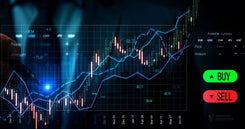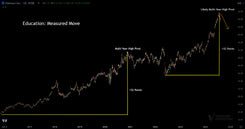Elite Trader & Investor: Control Emotion To Maximize Gains

The world of finance can be a rollercoaster of numbers, charts, and split-second decisions. While logic and strategy should be the driving forces behind successful trading and investing, human beings are inherently emotional creatures. These emotions, if left unchecked, can significantly impact our financial decisions, often leading to costly mistakes. Let's explore how emotions can sabotage even the most well-intentioned traders and investors.
1. Fear
Fear is a powerful emotion that can trigger impulsive reactions. In trading, fear often manifests as the dreaded "panic sell." When the market takes a downturn, fear can drive investors to sell off their assets at a loss, fearing further decline. This emotional response can lock in losses and prevent potential gains if the market recovers. Similarly, fear of missing out (FOMO) can lead to impulsive buying decisions, chasing trends without proper research.
2. Greed
Greed is the insatiable desire for more. While ambition can be a driving force for success, unchecked greed can lead to excessive risk-taking. Traders might overleverage their positions, chasing unrealistic gains, or hold onto winning positions for too long, hoping for even greater profits. This can result in devastating losses if the market takes an unexpected turn.
3. Hope
Hope can be a double-edged sword in the financial markets. While optimism is generally positive, clinging to hope in the face of mounting losses can be detrimental. Investors might hold onto losing positions, hoping for a turnaround that never comes, leading to further losses. This "hope-driven" behavior prevents rational decision-making and can significantly damage a portfolio.
4. Overconfidence
A string of successful trades can inflate an investor's ego, leading to overconfidence. This can manifest as neglecting risk management strategies, ignoring warning signs, or believing they have an infallible ability to predict the market. Overconfidence can blind traders to potential pitfalls and lead to reckless decisions.
5. Regret
Regret is a common emotion after making a losing trade. Dwelling on past mistakes can cloud judgment and lead to impulsive actions to "make up" for losses. This can create a cycle of emotional trading, where decisions are driven by past regrets rather than sound analysis.
Strategies for Emotional Control
- Self-Awareness: Recognize your emotional triggers and how they impact your trading decisions.
- Develop a Plan: Create a trading plan with clear entry and exit strategies, and stick to it.
- Risk Management: Implement strict risk management rules to limit potential losses.
- Take Breaks: Step away from the market when emotions are running high.
- Seek Education: Continuously learn and improve your trading skills.
Emotions are an integral part of the human experience, but they can be detrimental to financial success. By recognizing the influence of emotions and implementing strategies for control, traders and investors can make more rational decisions, minimize losses, and increase their chances of achieving their financial goals.
Trading involves substantial risk. All content is for educational purposes only and should not be considered financial advice or recommendations to buy or sell any asset. Read full terms of service.



